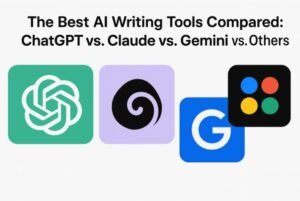Remote Work Isn’t the Future—It’s the Now
Remote work is no longer a trend it’s the standard. In 2025, nearly 40% of professionals work remotely at least part-time, and the demand for automation, productivity, and AI-powered workflows has skyrocketed.
Whether you’re a freelancer, digital nomad, or work-from-home employee, mastering the right tech can give you a serious competitive edge. This guide reveals the top 7 AI tools every remote worker should be using in 2025—tools that save time, reduce stress, and supercharge output.
From smart scheduling to writing assistants and virtual meetings, these free and paid tools can literally change the way you work.
Why AI Tools Are Essential for Remote Workers
Here’s why remote professionals are turning to AI:
Save hours weekly through automation
Boost productivity without burnout
Communicate clearly and quickly
Delegate repetitive tasks to virtual agents
Work asynchronously across time zones with fewer barriers
Let’s break down the tools making all this possible.
The Top 7 AI Tools Every Remote Worker Should Be Using in 2025
1. Notion AI – Your Second Brain for Work & Life
Category: Productivity, Note-Taking, Planning
Best For: Organizing projects, writing content, automating documentation
What It Does:
Automatically summarizes long notes or meeting transcripts
Helps write blog posts, emails, or reports
Generates tables, checklists, and content outlines
Integrates with databases, calendars, and task boards
Real Use Case:
I use Notion AI to summarize my Zoom meetings, plan weekly blog posts, and auto-generate task lists from voice notes.
Pricing:
Free plan available
AI access starts from $10/month
2. ChatGPT (Free or Plus) – The All-Around Virtual Assistant
Category: Writing, Brainstorming, Coding, Task Management
Best For: Content creation, brainstorming ideas, writing code, quick research
What It Does:
- Answers questions, writes emails, creates outlines
- Acts like a research assistant, creative writer, and language tutor
- Provides personalized replies, translations, summaries
Real Use Case:
ChatGPT helps me rewrite emails, create outreach scripts, and even plan my weekly goals—like having a smart, calm assistant on standby 24/7.
Pricing:
Free (GPT-3.5)
GPT-4 via Plus plan: $20/month
3. GrammarlyGO – AI-Powered Writing Assistant
Category: Writing, Editing, Communication
Best For: Professional writing, client emails, reports, social media content
What It Does:
Fixes grammar, tone, and clarity in real-time
Rewrites sentences with AI for different styles or tones
Integrates with Google Docs, email, Slack, and more
Real Use Case:
I use GrammarlyGO for every client email and proposal—it keeps my tone professional and mistakes minimal.
Pricing:
Free for basic corrections
Premium AI features start at $12/month
4. Krisp AI – Noise Cancellation for Remote Meetings
Category: Audio Productivity, Meetings
Best For: Professionals in noisy environments (home, cafes, co-working spaces)
What It Does:
Uses AI to mute background noise on your mic and speakers
Works with Zoom, Google Meet, Teams, and other apps
Improves call clarity without needing headphones or mics
Real Use Case:
During a client pitch from a loud coffee shop in Lisbon, Krisp saved the day—my voice was clear even with blenders in the background.
Pricing:
Free with 60 minutes/day
Premium from $8/month
5. Motion – AI Calendar & Task Scheduler
Category: Time Management, Scheduling
Best For: Remote workers with meetings, projects, and distractions
What It Does:
- Automatically builds your daily schedule from tasks
- Reschedules items around your changing availability
- Prioritizes based on deadlines and work hours
Real Use Case:
Motion plans my day so I don’t have to. It schedules deep work around meetings and sends reminders to stay focused.
Pricing:
Starts at $19/month (no free plan currently)
6. Descript – Smart Audio/Video Editor with AI
Category: Multimedia, Podcasts, Video Editing
Best For: Remote teams creating training videos, podcasts, YouTube content
What It Does:
- Transcribes voice to editable text
- Lets you edit video like a Word doc
- Removes filler words, generates voiceovers, fixes audio quality
Real Use Case:
I recorded a podcast, uploaded it, and edited everything by just deleting words from the transcript—Descript made me a video editor overnight.
Pricing:
Free plan available
Paid plans from $12/month
7. Zapier + AI Integrations – Your Digital Workflow Butler
Category: Automation, Integration
Best For: Streamlining repetitive tasks, data transfer, CRM updates
What It Does:
- Connects apps like Gmail, Slack, Notion, Google Sheets
- Uses AI to trigger actions (e.g., summarize email → auto-send report)
- Saves hours on data entry, notifications, follow-ups
Real Use Case:
I use Zapier to automatically log Zoom meetings into Google Sheets, send summaries to Slack, and set follow-up reminders via Google Calendar.
Pricing:
Free for 100 tasks/month
Premium plans from $19.99/month
Comparison Table: Top AI Tools at a Glance
| Tool | Category | Best Feature | Free Plan | Best For |
|---|---|---|---|---|
| Notion AI | Productivity | Summarizing + content gen | ✅ | Writers, planners, teams |
| ChatGPT | General AI | Flexible conversation agent | ✅ | Everyone |
| GrammarlyGO | Writing | Polished, tone-aware writing | ✅ | Writers, professionals |
| Krisp | Meetings | Noise cancellation | ✅ | Remote teams, freelancers |
| Motion | Time management | Smart calendar automation | ❌ | High-schedule professionals |
| Descript | Media editing | Text-based video editing | ✅ | Podcasters, YouTubers |
| Zapier + AI | Automation | Workflow triggers | ✅ | System builders, marketers |
Why These AI Tools Matter in 2025
AI is integrated into daily workflow, not just novelty tools
Remote workers need automation and smart assistants to manage growing workloads
These tools adapt to your needs, saving time, improving focus, and enhancing creativity
“It’s not about replacing humans—it’s about removing the friction between thought and execution.”
– David Heinemeier Hansson, CTO of Basecamp
Expert Tips to Maximize AI Tool Use
- Don’t adopt too many at once—master 1–2 first
- Automate repeatable tasks (like calendar syncing, follow-ups)
- Use AI to assist creativity, not replace it
- Integrate tools via Zapier, Make.com, or Slackbots
- Track your results and refine your workflow monthly
Personal Story: How I Work 30 Hours/Week with 7 AI Tools
Contributor: Lara G., Remote UX Consultant
“I used to work 50 hours a week managing emails, meetings, reports, and marketing tasks. After integrating these 7 AI tools, I reduced that by nearly 40%. My AI stack now helps me brainstorm, write, schedule, and even transcribe interviews. I feel less stressed, more productive, and finally in control of my time.”
Build Your Smart Remote Office
AI isn’t just for engineers or enterprise teams. With these 7 tools, every remote worker can become more efficient, focused, and creative.
Whether you’re managing projects, building content, or collaborating across time zones, this guide on the top 7 AI tools every remote worker should be using in 2025 equips you with everything you need to thrive in the new era of digital work.
Which tool are you most excited to try? Drop your thoughts in the comments!
Want a free AI tool stack setup guide? Subscribe to our newsletter.
Bookmark this guide—you’ll want to revisit as new AI updates roll out.




